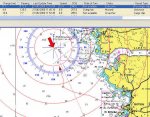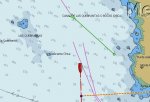Resolution
Well-Known Member
BrianI agree, however . . . .
For those whose memory of that incident may have dimmed in the intervening 14 years, the yacht Ouzo, a lifting keel Sailfish 25, was sunk with the loss of all three of the crew by a possible close encounter with what was judged to have been the ferry ship Pride of Bilboa, for which the second officer, on watch at the time, stood trial for manslaughter but was found not guilty due to lack of sufficient evidence that the yacht involved in a near-miss at the time of the Ouzo's loss, was indeed the Ouzo.
In my agreement with your statement we both would be taking issue with a very important conclusion in the MAIB report that AIS would not have influenced the outcome: "AIS is being carried by an increasing number of yachts, partly to assist in their being more visible. Had Ouzo carried AIS it would have made no difference to the outcome as AIS information was not displayed on the radar of Pride of Bilbao. This situation should improve as AIS is being integrated into more ship systems in the future"
For me, this statement raises more questions than it answers. Firstly, the report fails to inform just what the Pride of Bilbao had installed for AIS receiver processing but if it was the least sophisticated system merely to comply with the SOLAS regulations then she possibly had a MKD (Minimum Keyboard and Display) device, the display screen of which is so small that it is not much use as a CPA warning unit, having only a line of text data for each target received.
But the report fails to consider that the Ouzo could have taken some other action had their crew been better informed, which would have been the case with just an AIS receiver and no transponder. With the call sign, name, position and course of the Pride of Bilbao, including the final and lethal change of course that the CPA would have given, the crew may have had warning and data enough to have made a lifesaving change of course and/or VHF call on channel 16 to warn the Pride of Bilbao directly of their presence and position.
Included in the MAIB report was also some very revelatory information: "In the course of the investigation, the MAIB accident database was searched for relevant similar cases. In the last 10 years, there had been 87 hazardous incidents between yachts and merchant vessels in open sea conditions, and 14 collisions."
"On 28 August 2000, at about 2200, in moderate to good visibility, Pride of Bilbao was involved with a near collision with the yacht Aliniel (Moody 30) south of the Isle of Wight. Pride of Bilbao, when less than a mile from the yacht, changed her course and headed directly towards her. The crew only had enough time to put the engines full ahead and to shine a powerful light onto the sails; there was no time to use flares despite them being readily accessible by the chart table. On this occasion, Pride of Bilbao did take effective emergency action and eventually passed less than a cable away." The Pride of Bilbao again and south of the Isle of Wight!
This sad case was a real eye-opener for me and, I suspect, many of us who have sailed small craft in the Channel. Like others on these forums, it spurred me into making some changes to the kit on my boat - AIS, new LED Nav. Lights, and more white flares.
And I really cannot understand how the guys on the Pride of Bilbao got off Scot free.


